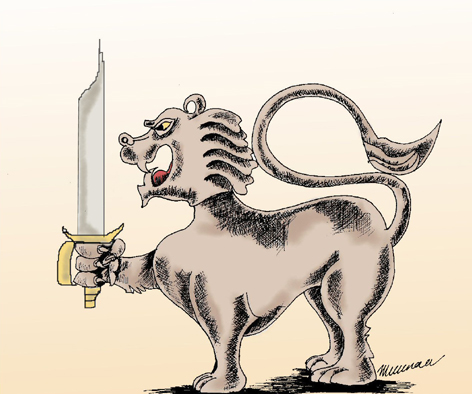Tamil Guardian editorial, London, September 28, 2020

Sri Lanka’s president has wasted little time in getting to work. Within weeks of his party sweeping parliamentary polls, Gotabaya Rajapaksa rapidly produced the long-promised 20th Amendment to Sri Lanka’s constitution, which seeks to further concentrate power into the executive presidency he occupies. As expected, there are few checks on his power and with a super-majority in parliament, a determined Rajapaksa looks set to steamroll it through. Despite protests lodged in Sri Lanka’s Supreme Court, it seems there is little that can stop him. As drama over the amendment continues, it is clear the Rajapaksas have shifted up a gear. The island is now entering a new era – one where any pretence of liberalism and respect for human rights has been dropped and military rule is in place, particularly across the Tamil homeland where repression has intensified. A brash, militarised, racist and authoritarian regime is in power. And it looks set to stay.
Rajapaksa’s hawkish extremism has never been under question. As Sri Lanka’s defence secretary, he furiously defended the military’s shelling of hospitals, oversaw the assassination of journalists and threatened to hang those who exposed war crimes. The massacre of tens of thousands of Tamils took place explicitly under his direction. Indeed, his previous tenure shows why the trajectory of his current rule is not to be taken lightly. The military is now becoming an ever more present force, from pre-schools to tea plantations. The rising hate speech by Buddhist monks in recent months – warning of rivers of blood in the North-East – is the mainstream. Sinhala nationalism, which for decades has wrought violence on the island, has been given a new lease of life.
The state of Sri Lanka’s politics is unsurprising. The defeat of the LTTE more than a decade ago did not pave the way for the island to become a liberal bastion. Instead, it cemented Sri Lanka’s shift to the opposite end of the spectrum, as a triumphalist Sinhala nationalist regime ruled with an international carte blanche. In the years since there has been feeble international resistance to Colombo’s repressive policies. Dogged Tamil resistance and dedication towards accountability and justice, in the diaspora and in the homeland, helped bring in early moves at the UN Human Rights Council, but with no tangible consequences for failing to fulfil resolutions, which Sri Lanka has openly flouted for years, the state has repeatedly been let off the hook. Even the previous regime’s short-lived liberal façade produced no accountability, no justice and still no peace. And now the current regime is teaching the international community a lesson. Left unchecked, toxic Sinhala nationalism will fester and continue to bring more instability and even more violence.
The future of the island is indeed bleak. Not just for the Tamils of Eelam, but for Muslims, human rights activists, journalists and civil society. The past year alone has seen all suffer under Colombo’s grip. Repression of the North-East, in particular, has stepped up, with activists being summoned for questioning and facing arrests. Just this week, Sri Lanka’s security forces and judiciary attempted to halt commemorations of Lt. Col. Thileepan’s sacrifice, even passing a ban on a planned hunger strike. Despite this, Tamils braved the intimidation and engaged in peaceful protests, remaining resolute in their call for demilitarisation, the return of land, release of political prisoners and accountability for disappearances and for genocide. These are all demands that have been echoed throughout the decades, including from Thileepan. And as we publish today, it is those calls that will resonate again throughout the North-East as a hartal across the region showcases that spirit of resistance once more. Now more than ever, those across the island must join their call and unite against an unbridled and toxic Sinhala chauvinism.
This ultra-nationalist regime is a product of decades of failure to fix Sri Lanka’s deeply racist institutions. It cannot continue to be normalised. As history has shown attempting to coax the Rajapaksas towards reform brings no dividends. Instead, their rule brings militarisation, corruption and human rights violations. There is only one way to deal with war criminals in Sri Lanka. Hold them accountable. Or else they will roam free, perpetuate more cycles of violence and may rule the island with more power than ever before.